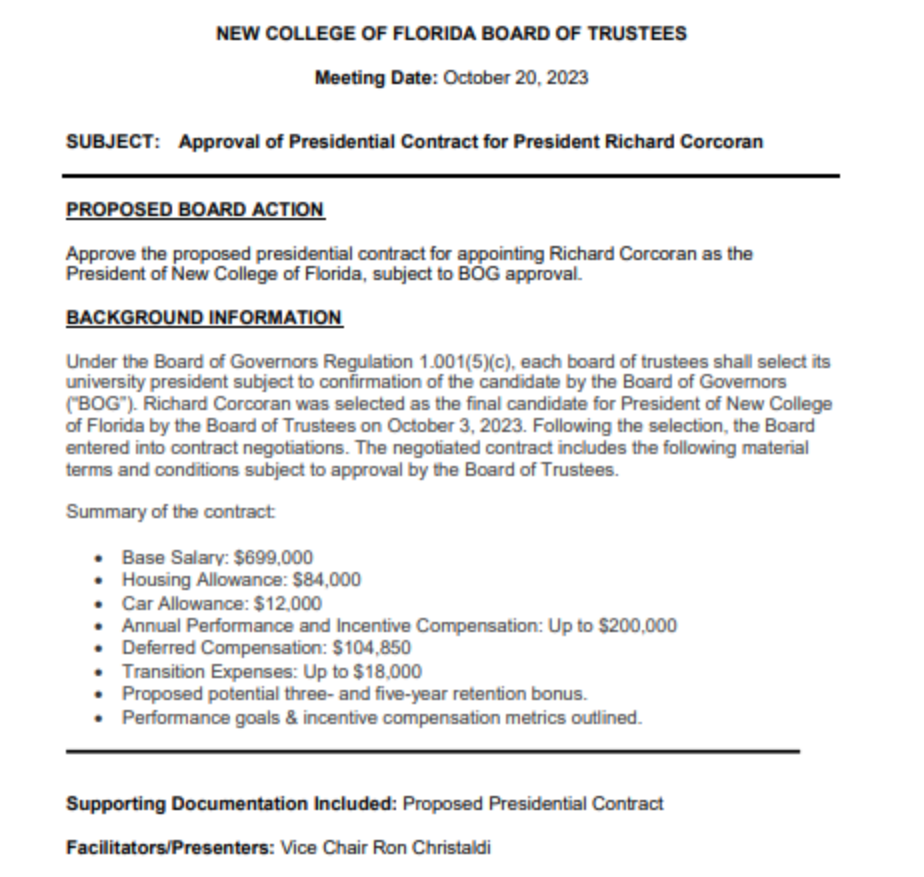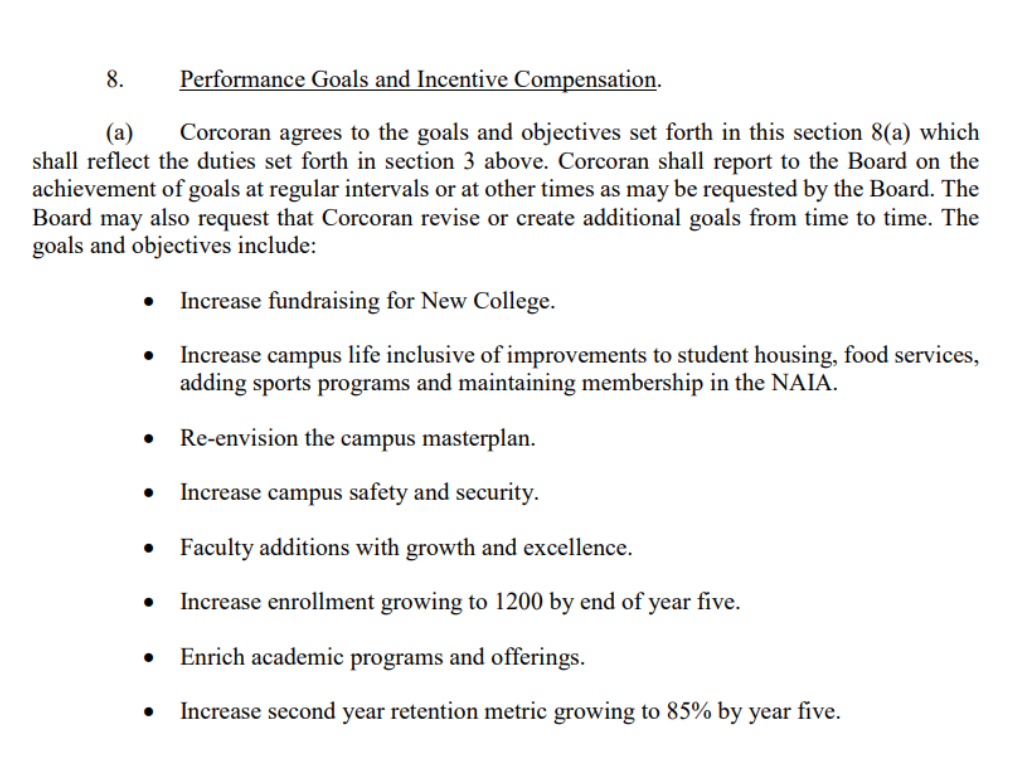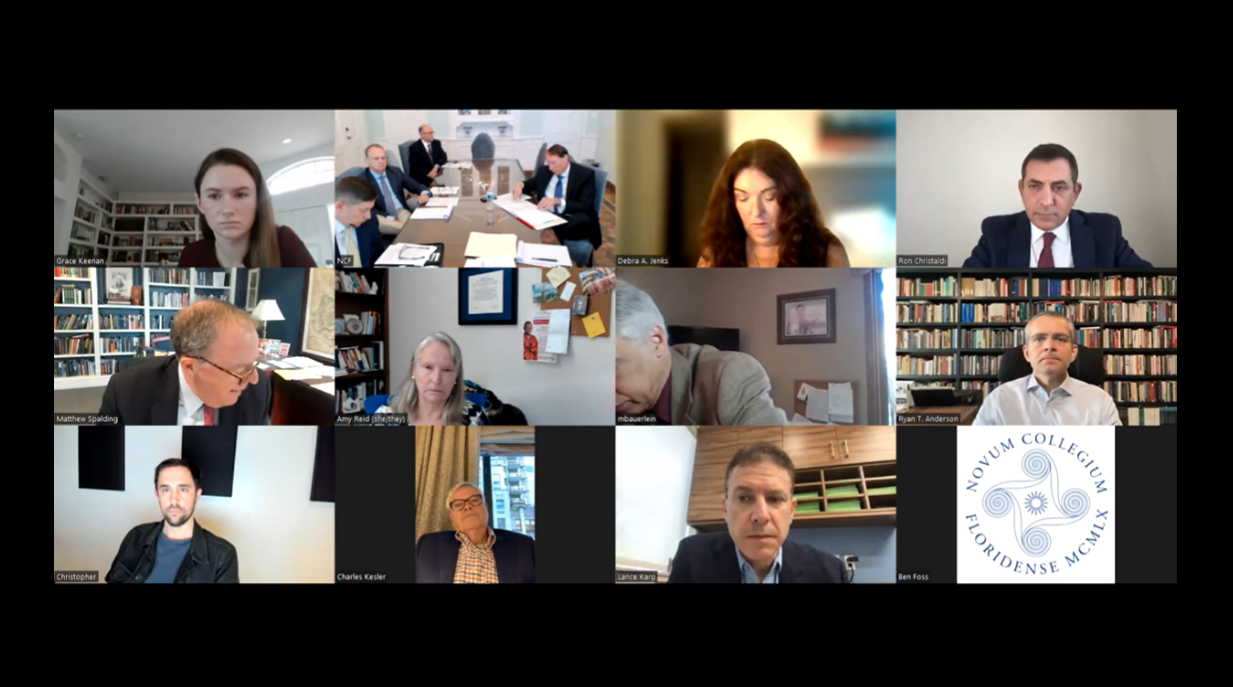President Richard Corcoran’s employment contract was the primary topic of discussion at the Oct. 20 Board of Trustees (BOT) meeting. The contract was negotiated and presented by Vice Chair Ron Christaldi, and after an hour-long discussion the BOT moved to approve the document. The motion passed with objections from two trustees, Faculty Representative Amy Reid and Student Representative Grace Keenan.
The two-hour meeting took place over Zoom. It is worth noting that this meeting was held over Fall Break, a time when the majority of students had left campus to vacation or return home. As usual, the meeting began with public comments:
Eliana Salazar, parent of a New College student, began her public comment by stating, “I’m not here to complain today, I’m actually here to congratulate Richard Corcoran: Congratulations on breaking something beautiful… Congrats on giving hope to every mediocre white man in America that despite having no academic background, no expertise in higher education, no personality, no people skills, that you can become, someday, a million dollar dean of the smallest public college in Florida.”
Salazar wasn’t the only one to bring up Corcoran’s proposed salary in comparison to New College’s size.
“In what public higher education universe does a college one quarter the size of many American high schools have a top administrator making close to 1.12 million?” Sarasota-Charlotte Democratic Progressive Caucus board member Robin Williams questioned.
Following public comment, the Board moved to approve the consent agenda. Reid moved to remove the discussion of the Campus Master Plan from the consent agenda, to be treated as a separate issue. This motion was not seconded, and the Board discussed the Campus Master Plan for approximately ten minutes before Trustee Ron Christaldi interjected, requesting that they table this issue in order to focus on more important matters: the employment contract. He then stated that they would return to the issue if time permitted.
Christaldi was the Trustee responsible for producing the contract and he was the one who presented and defended it to the Board.
The contract began with a brief summary: Corcoran will receive a base salary of $699,000 along with an “Annual Performance and Incentive Compensation” of up to $200,000. A deferred compensation of $104,850 is also included in the contract. Along with the base salary and bonuses, Corcoran will also receive $84,000 for a housing allowance, $12,000 for a car allowance and a transition expense of up to $18,000.

The Annual Performance and Incentive Compensation (Section 8 of the contract) states a list of goals and objectives for Corcoran to achieve. This bonus is awarded at the discretion of the BOT after evaluating Corcoran’s performance. These goals include increasing enrollment to 1,200 by the end of year five of his presidency, enriching academic programs and offerings and increasing the second-year student retention metric, growing it to 85 percent by year five.

Christaldi began his presentation by saying, “Fundamentally, this contract is not about what we pay an individual, in my opinion, it’s about how we achieve the goals of this institution through the hiring of a president and how we align that president’s goals and contractual terms with those goals in vision and objectives of the university.”
He then addressed the public comments that mentioned the size of New College compared to other institutions.
“I know there’s been a lot of public comment about the size of our institution, the state of our institution, and I will submit to you all that I did not focus on where we are today, I focused on where our expectations are for our president on where we need to be, where we want to be.” Christaldi explained.
Christaldi went on to explain the specifics of the employment contract. The term of the contract is five years, starting Feb. 22, 2023 when Corcoran was named Interim President. Listed in the bullet-point summary above as “Proposed potential three- and five-year retention bonus,” Corcoran will receive an annual bonus of $200,000 for the first three years of his term. He will receive an annual $100,000 for the remaining two years.
Christaldi then asked Trustee Matthew Spalding for a comment regarding the contract. Spalding began by stating that Corcoran works for the BOT and reports to the BOT. He went on to praise Christaldi’s work.
Christaldi then asked Corcoran if he’d like to comment on the contract. Corcoran stated, “I thought negotiating with you was a very honorable process… I felt that both of us were looking out for the long-term success of New College.”
Once the comments from Spalding and Corcoran had concluded, Christaldi opened the contract up for discussion. Keenan spoke first, saying that she had a few questions regarding the document.
She stated that the contract was shared with the Board approximately 23 hours before the meeting took place, then pointed out that individuals who wish to register for public comments must do so 48 hours prior to a BOT meeting. Keenan’s concern was that the community did not get a chance to see the contract before the deadline to register for public comment was closed.
Christaldi responded to Keenan by stating that he had 17 days to produce and negotiate the contract and that is why it was not released sooner. He described his experience as “surprising,” as he was not expecting to be assigned to this project.
“There was no intention to delay or anything, we just set the timing in a way that made it a little bit difficult to get it out sort of a week in advance,” Christaldi stated.
Keenan then asked what would happen to the previous contract regarding Corcoran’s Interim President position. General Counsel Bill Galvano responded, stating that the previous contract would merge with the present one.
“We previously got a budget from the Foundation that doesn’t account for this salary, so do we have a number of how much more the Foundation is going to have to raise to account for this salary… Do we have a specific number of how much we’re going to have to raise?” Keenan asked next.
Christaldi mentioned a figure of $188,000.
Spalding then interjected, “One of [Corcoran’s] incentives to receive [the retention bonus] is to raise money. If he doesn’t raise the money, he’s not going to receive that—that’s how an incentive works, we intentionally set it up that way.”
Keenan moved on and requested that the Presidential Review Committee meet in order to discuss the goals and objectives for Corcoran. She stated that the Board was supposed to conduct a similar meeting when Corcoran was elected as Interim President, but they never did.
Keenan concluded her thoughts by requesting that the sixth bullet of Section 8(a) of the contract be adjusted. This section is in regard to the goals and objectives set for Corcoran. The bullet point states, “Increase enrollment growing to 1200 by end of year five.” Keenan wished to amend this by including, “without sacrificing academic standards.”
Christaldi agreed with Keenan, maintaining the idea that academic standards should not be sacrificed for the sake of enrollment.
With Keenan’s thoughts and questions concluded, the Board moved on to focus on Reid’s comments and concerns.
Reid began by stating that Section 8(a) is vague. She agreed with Keenan regarding the amendment to the sixth bullet point, while also pointing out the difference between academic rigor and quality versus enriching academic programs.
“Enriching academic programs is not the same thing as the caliber of the students.” Reid said. “Because we saw this year not only a 24-point drop in our ratings, but a significant drop in terms of the GPAs and test scores of the admitted students, and I hope that’s not going to be the case going forward.”
Reid also recommended that the contract be adjusted to begin on July 1, 2023, in order to give the New College Foundation more time to fundraise and gather money for Corcoran’s annual bonus.
Christaldi responded to this by explaining that Corcoran’s bonuses are at the discretion of the Board. He can receive up to the $200,000 stated in the contract, but that does not mean the Board will award him a bonus automatically.
“We retain the discretion, as the Board, on how to communicate what our expectations are and we, as a Board, will decide whether or not the President has met those goals that we’ve set out,” Christaldi explained.
Reid eventually circled back to her original point regarding the vague language of the contract. “I would be uncomfortable signing a contract where the criteria upon which I would be evaluated for my work were so vague,” she said.
Similar to Keenan, Reid also emphasized the importance of a Presidential Review Committee in order to discuss the goals and the criteria for achieving them. Chair Debra Jenks stated that she will speak to the General Council in order to fulfill this request.
Reid suggested an amendment to the contract, stating that the BOT will meet to discuss Corcoran’s progress throughout his term. However, Christaldi was hesitant to comply, stating that in a situation where the Board failed to do so, Corcoran could potentially have the opportunity to pursue legal action.
Reid concluded her comments by requesting that Section 15 of the contract be removed altogether. Section 15 states that upon the end of Corcoran’s term as president, he can be appointed as an NCF faculty member. Reid wished this to be struck, as Corcoran has no prior experience in teaching. This concern has been noted previously in news reports. Keenan seconded and requested that the Board vote on this motion, the contract and then conclude the meeting by setting up times and schedules for a Presidential Evaluation Committee meeting.
The Board discussed Reid’s motion, with Corcoran stating that he has no qualms with this section being struck from the contract.
The Board voted and the motion failed.
The Board then voted on the employment contract. The motion passed with Keenan and Reid voting against approval of the contract.
Keenan then moved that the Campus Master Plan be sent to the Strategic Planning Committee in order to advise the Board. Reid seconded the motion, but Keenan withdrew it and the issue was tabled for a later meeting.
Keenan moved that the Strategic Planning Committee, the Presidential Review Committee and the Student Affairs Committee meet within the next four months. “I just think we need some sort of motion to make sure this happens because we’ve been asking for this for a couple months now,” Keenan stated.
Reid requested that the motion be amended in order to require the committees to meet within two months rather than four. Keenan compromised, suggesting the end of Jan. 2024. This caused other Board members to erupt in protest.
“To force them to meet in a situation where you guys are just trying to drive an agenda, I just object to that,” Spalding argued.
Trustee Christopher Rufo also objected, claiming that this motion gives the impression that the Board is attempting to “micromanage” committees that should manage themselves.
“I would say it should be noted that the two Trustees who voted against the interim President, against the permanent President, and now against the contract, that should be taken into account,” Rufo stated with regard to Keenan and Reid. “Their sentiments should be taken into account and I would not award them extra deference. It strikes me as part of a pattern of trying to delay, trying to obfuscate, trying to bog down the board and so I would be wholeheartedly against this.”
Keenan then reverted back to the original time frame of four months, but the motion failed.
The meeting was adjourned, leaving Corcoran set to be one of the highest-paid public university presidents in Florida, pending approval by the Florida Board of Governors. In comparison, University of Florida (UF) President Ben Masse receives approximately $1.3 million with benefits while managing a school with approximately 61,000 students. Corcoran’s new contract awards him almost the same amount while he manages an institution with fewer than 800 students.

